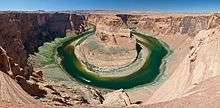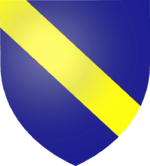Definify.com
Webster 1913 Edition
Bend
Bend
,Verb.
T.
[
imp. & p. p.
Bended
or Bent
; p. pr. & vb. n.
Bending
.] 1.
To strain or move out of a straight line; to crook by straining; to make crooked; to curve; to make ready for use by drawing into a curve;
as, to
. bend
a bow; to bend
the knee2.
To turn toward some certain point; to direct; to incline.
“Bend thine ear to supplication.” Milton.
Towards Coventry
bend
we our course. Shakespeare
Bending
her eyes . . . upon her parent. Sir W. Scott.
3.
To apply closely or with interest; to direct.
To
bend
his mind to any public business. Temple.
But when to mischief mortals
bend
their will. Pope.
4.
To cause to yield; to render submissive; to subdue.
“Except she bend her humor.” Shak.
5.
(Naut.)
To fasten, as one rope to another, or as a sail to its yard or stay; or as a cable to the ring of an anchor.
Totten.
To bend the brow
, to knit the brow, as in deep thought or in anger; to scowl; to frown.
Camden.
Syn. – To lean; stoop; deflect; bow; yield.
Bend
,Verb.
I.
1.
To be moved or strained out of a straight line; to crook or be curving; to bow.
The green earth’s end
Where the bowed welkin slow doth
Where the bowed welkin slow doth
bend
. Milton.
2.
To jut over; to overhang.
There is a cliff, whose high and
Looks fearfully in the confined deep.
bending
headLooks fearfully in the confined deep.
Shakespeare
3.
To be inclined; to be directed.
To whom our vows and wished
bend
. Milton.
4.
To bow in prayer, or in token of submission.
While each to his great Father
bends
. Coleridge.
1.
A turn or deflection from a straight line or from the proper direction or normal position; a curve; a crook;
as, a slight
. bend
of the body; a bend
in a road2.
Turn; purpose; inclination; ends.
[Obs.]
Farewell, poor swain; thou art not for my
bend
. Fletcher.
3.
(Naut.)
A knot by which one rope is fastened to another or to an anchor, spar, or post.
Totten.
5.
(Mining)
Hard, indurated clay; bind.
6.
pl.
(Med.)
same as
caisson disease
. Usually referred to as the bends
. Bends of a ship
, the thickest and strongest planks in her sides, more generally called wales. They have the beams, knees, and foothooks bolted to them. Also, the frames or ribs that form the ship's body from the keel to the top of the sides; as, the midship bend.
1.
A band.
[Obs.]
Spenser.
2.
(Her.)
One of the honorable ordinaries, containing a third or a fifth part of the field. It crosses the field diagonally from the dexter chief to the sinister base.
Bend sinister
(Her.)
, an honorable ordinary drawn from the sinister chief to the dexter base.
Webster 1828 Edition
Bend
BEND
, [L.pando,pandare, to bend in; pando, pandere, to open; pandus, bent, crooked]1.
To strain, or to crook by straining; as, to bend a bow.2.
To crook; to make crooked; to curve; to inflect; as, to bend the arm.3.
To direct to a certain point; as, to bend our steps or course to a particular place.4.
To exert; to apply closely; to exercise laboriously; to intend or stretch; as, to bend the mind to study.5.
To prepare or put in order for use; to stretch or strain. He hath bent his bow and made it ready. Ps.7.
6.
To incline; to be determined; that is, to stretch towards, or cause to tend; as, to be bent on mischief.7.
To subdue; to cause to yield; to make submissive; as, to bend a man to our will.8.
In seamanship, to fasten, as one rope to another or to an anchor; to fasten, as a sail to its yard or stay; to fasten, as a cable to the ring of an anchor.9.
To bend the brow, is to knit the brow; to scowl; to frown.BEND
,Verb.
I.
1.
To incline; to lean or turn; as, a road bends to the west.2.
To jut over; as a bending cliff.3.
To resolve, or determine.[See Bent on.]4.
To bow or be submissive. Is.60.BEND
,Noun.
1.
In marine language, that part of a rope which is fastened to another or to an anchor. [See To bend. No.8.]2.
Bends of a ship, are the thickest and strongest planks in her sides, more generally called wales. They are reckoned from the water, first, second or third bend. They have the beams,knees, and foot hooks bolted to them, and are the chief strength of the ship's sides.3.
In heraldry, one of the nine honorable ordinaries, containing a third part of the field, when charged, and a fifth, when plain. It is made by two lines drawn across from the dexter chief, to the sinister base point. It sometimes is indented, ingrained, &c.BEND
,Noun.
Definition 2026
bend
bend
English

A bend in a river
Verb
bend (third-person singular simple present bends, present participle bending, simple past and past participle bent or (archaic) bended)
- (transitive) To cause (something) to change its shape into a curve, by physical force, chemical action, or any other means.
- If you bend the pipe too far, it will break.
- Don’t bend your knees.
- (intransitive) To become curved.
- Look at the trees bending in the wind.
- (transitive) To cause to change direction.
- Milton
- Bend thine ear to supplication.
- Shakespeare
- Towards Coventry bend we our course.
- Sir Walter Scott
- bending her eyes […] upon her parent
- Milton
- (intransitive) To change direction.
- The road bends to the right
- (intransitive) To be inclined; to direct itself.
- Milton
- to whom our vows and wishes bend
- Milton
- (intransitive, usually with "down") To stoop.
- He bent down to pick up the pieces.
- (intransitive) To bow in prayer, or in token of submission.
- Coleridge
- Each to his great Father bends.
- Coleridge
- (transitive) To force to submit.
- They bent me to their will.
- Shakespeare
- except she bend her humour
- (intransitive) To submit.
- I am bending to my desire to eat junk food.
- (transitive) To apply to a task or purpose.
- He bent the company's resources to gaining market share.
- Temple
- to bend his mind to any public business
- Alexander Pope
- when to mischief mortals bend their will
- (intransitive) To apply oneself to a task or purpose.
- He bent to the goal of gaining market share.
- (transitive) To adapt or interpret to for a purpose or beneficiary.
- (transitive, nautical) To tie, as in securing a line to a cleat; to shackle a chain to an anchor; make fast.
- Bend the sail to the yard.
- (transitive, music) To smoothly change the pitch of a note.
- You should bend the G slightly sharp in the next measure.
- (intransitive, nautical) To swing the body when rowing.
Derived terms
terms derived from bend (verb)
Translations
to cause to shape into a curve
|
|
to become curved
to change direction
to be inclined; to direct itself
|
to force to submit
to submit
|
to apply oneself to a task or purpose
|
to tie a line
to change the pitch
to swing the body when rowing
Noun
bend (plural bends)

Azure a bend or, the arms of Scrope
- A curve.
- 1968, Johnny Cash, Folsom Prison Blues
- I hear the train a comin'/It's rolling round the bend
- 1913, Joseph C. Lincoln, chapter 1, in Mr. Pratt's Patients:
- I stumbled along through the young pines and huckleberry bushes. Pretty soon I struck into a sort of path that, I cal'lated, might lead to the road I was hunting for. It twisted and turned, and, the first thing I knew, made a sudden bend around a bunch of bayberry scrub and opened out into a big clear space like a lawn.
- There's a sharp bend in the road ahead.
- 1968, Johnny Cash, Folsom Prison Blues
- Any of the various knots which join the ends of two lines.
- 2012, Percy W. Blandford, Practical Knots and Ropework, page 67:
- A simpler version of the common bend with its ends in the same direction is used to join binder twine in a hay baling machine.
-
- (in the plural, medicine, diving, with the) A severe condition caused by excessively quick decompression, causing bubbles of nitrogen to form in the blood; decompression sickness.
- A diver who stays deep for too long must ascend very slowly in order to prevent the bends.
- (heraldry) One of the honourable ordinaries formed by two diagonal lines drawn from the dexter chief to the sinister base; it generally occupies a fifth part of the shield if uncharged, but if charged one third.
- 1968, Charles MacKinnon of Dunakin, The Observer's Book of Heraldry, pages 63-64:
- Perhaps the most celebrated coat of arms is that of Scrope, which is Azure a bend Or. This is the coat over which, from 1385 to 1390, Sir Robert le Grosvenor and Sir Richard le Scrope invoked the High Court of Chivalry to decide which of them had the right to bear these arms. Chaucer gave evidence before the court. In the end the arms were awarded to Scrope, and Grosvenor was ordered to difference with a bordure Argent. This he disdained to do, and being highly dissatisfied with the verdict he appealed to Richard II who altered the decision of the court by refusing to allow the bend to Grosvenor at all! Grosvenor then adopted a garb, or sheaf of corn.
-
- (obsolete) Turn; purpose; inclination; ends.
- Fletcher
- Farewell, poor swain; thou art not for my bend.
- Fletcher
- In the leather trade, the best quality of sole leather; a butt.
- (mining) Hard, indurated clay; bind.
- (nautical, in the plural) The thickest and strongest planks in a ship's sides, more generally called wales, which have the beams, knees, and futtocks bolted to them.
- (nautical, in the plural) The frames or ribs that form the ship's body from the keel to the top of the sides.
- the midship bends
Derived terms
terms derived from bend (noun)
|
Translations
curve
knot
decompression sickness
|
|
heraldry: one of the ordinaries
best quality of sole leather
|
hard, indurated clay
Related terms
References
Anagrams
Albanian
Etymology
From Proto-Indo-European *band (“drop”). Compare Phrygian βεδυ (“water”), Sanskrit बिन्दु (bindú, “drop”), Middle Irish banna, baina (“drop”) and possibly Latin Fōns Bandusiae.
Noun
bend m